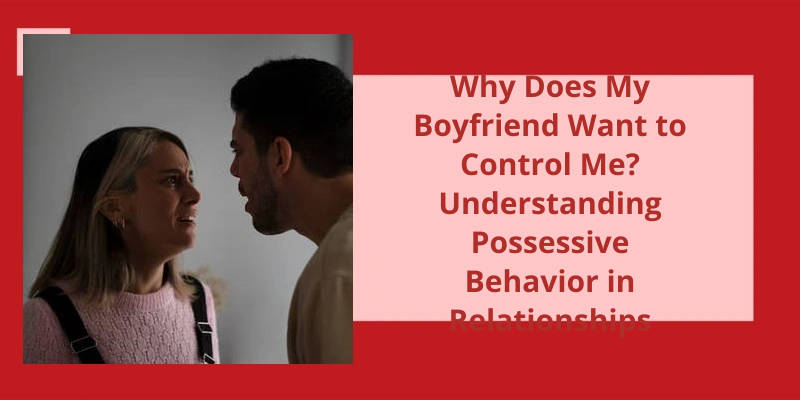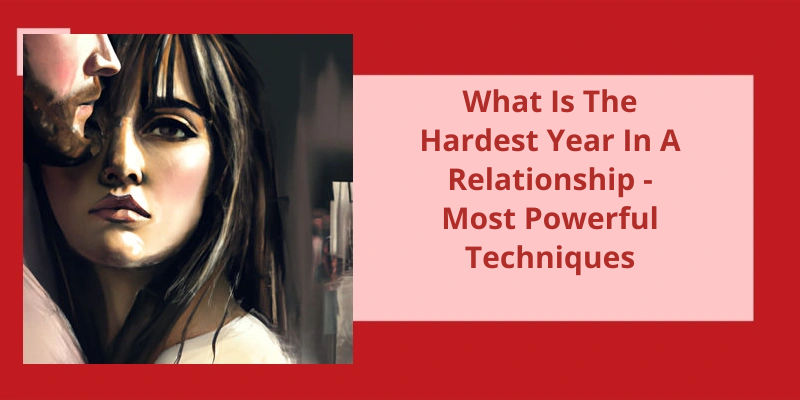In relationships, possessive behavior can manifest in various ways, leaving one partner feeling trapped, suffocated, and questioning their own autonomy. It can be perplexing and distressing when you find yourself asking the concerning question, "why does my boyfriend want to control me?" Understanding possessive behavior in relationships requires delving into complex dynamics influenced by factors such as insecurity, past experiences, power imbalance, and attachment styles. By exploring the underlying reasons behind this behavior, we can shed light on the motives and emotions driving your boyfriend's actions, ultimately enabling you to navigate and address the issue within your relationship.
Are Insecure Guys Controlling?
Insecure guys can often exhibit controlling behavior in relationships as a means of coping with their low self-esteem. Their need for control stems from deep-rooted insecurities and the fear of losing their partner or being inadequate in comparison. This controlling nature can manifest in various ways, such as constantly dictating your actions, making decisions for you, or attempting to restrict your freedom.
One common sign of control is an insecure boyfriend telling you what to wear, undermining your confidence and autonomy in choosing your own outfits. They may believe that by dictating your appearance, they can assert their dominance and ensure your loyalty. Similarly, they might try to control your finances, placing restrictions on how you spend your money to maintain a sense of power and control over your life.
Ultimately, it’s essential to recognize that a healthy relationship should be built on trust, support, and mutual respect. If your partners controlling behavior is causing feelings of suffocation or undermining your individuality, it’s crucial to address the issue and establish open lines of communication. Creating a safe space to discuss each others insecurities and working on building each other up can help redefine the dynamics of the relationship and promote a healthier, more balanced connection.
The Impact of Insecurity on Relationships: This Topic Could Delve Into How Insecurity, Particularly in Men, Can Affect the Overall Dynamics and Health of a Relationship.
- The constant need for reassurance and validation from their partner
- Jealousy and possessiveness leading to toxic behavior
- Difficulty in trusting their partner, leading to constant suspicion
- Low self-esteem and self-worth, resulting in seeking constant validation outside the relationship
- Critical and controlling behavior towards their partner
- Communication issues arising from fear of vulnerability and rejection
- Impact on intimacy and emotional connection in the relationship
- Poor conflict resolution skills, leading to frequent arguments and misunderstandings
- Strained emotional and mental well-being for both partners
- Potential for the relationship to become codependent or one-sided
Controlling behavior is often disguised as love, making it challenging to recognize the signs within a relationship. The misconception that control equates to care or affection can obscure the truth and lead individuals to justify such behavior. However, it’s crucial to acknowledge that love and control are fundamentally different concepts. Controlling behavior is rooted in the desire for power and manipulation, not genuine love.
Can You Love Someone and Be Controlling?
Controlling behavior in a relationship can be extremely harmful and damaging, often disguised as an expression of love. It’s crucial to understand that love and control aren’t synonymous. While it may be challenging to recognize such behavior, it’s important to distinguish that controlling behavior stems from a desire for power and manipulation, rather than genuine affection.
If you find yourself in a relationship where your partner exhibits controlling behavior, it’s essential to seek support and resources. Engaging in open and honest communication with a trusted friend, family member, or professional counselor can provide valuable insight and guidance. Remember that no one deserves to be controlled or manipulated; you’ve the right to a healthy and fulfilling relationship founded on mutual respect and love.
Source: If you’ve a controlling partner are they capable of loving …
In addition to expressing discontent about your relationships with others, a man who seeks to exert control may display a range of manipulative behaviors. This can include constantly questioning your decisions, isolating you from friends and family, monitoring your movements, demeaning you, or insisting on making choices for you. Recognizing these signs is crucial in identifying when someone is attempting to control, dominate, or manipulate you in a relationship.
How Do You Know a Man Wants to Control You?
Recognizing signs of possessive behavior in a relationship can be crucial for maintaining ones own well-being and autonomy. One key indicator that a man wants to control you is his constant complaints regarding the amount of time you spend with other people, such as friends or family. This control-seeking partner may express dissatisfaction with the hours you dedicate to nurturing other relationships, as it threatens their desire to dominate your time and attention.
Moreover, controlling partners often resort to putting down your loved ones, insinuating that they’re a detrimental influence on you. By belittling those close to you, these individuals aim to weaken your support system, making it easier for them to gain further control over your thoughts and actions. In doing so, they manipulate your perception of your friends and family, creating a division and insecurity within your relationships outside of their control.
Indicative of their possessive nature, controlling partners may display certain behaviors designed to ignite friction when you’re with your friends or family. This may manifest as passive-aggressive comments, disrespectful gestures, or creating tension through manipulative actions. These actions aim to undermine the time you spend with others and gradually isolate you from loved ones, contributing to the growing control and dominance they seek to establish over you.
By fostering difficulties or confrontations when you’re around friends or family, controlling partners are able to manipulate your emotions and reinforce their power over you. They may exploit moments of disagreement to reinforce narratives that paint your loved ones as negative influences, further perpetuating their control over your thoughts and behaviors. This manipulation tactic isolates you emotionally, making it harder to seek alternative perspectives or support systems that could potentially challenge their position of control.
By being aware of the control-seeking partners effort to manipulate and restrict your connections with others, you can take steps towards reclaiming your autonomy and seeking healthier relationship dynamics.
Understanding the triggers for controlling behavior can shed light on the underlying factors behind such actions. Insecurity and anxiety, often rooted in a deep-seated need for control, can drive individuals to exert dominance over their environment and people. However, it’s essential to recognize that controlling behavior may stem from more complex issues, including certain mental conditions that manifest as abnormal social expectations. By delving deeper into these aspects, a clearer understanding can be gained, leading to compassion and effective methods of support.
What Triggers a Controlling Person?
Controlling behavior in relationships can be triggered by a variety of factors, but insecurity and anxiety often play a significant role. When individuals feel insecure or anxious, they may seek to exert control over their partner as a means of alleviating their own discomfort. Instead of employing healthy coping mechanisms, they resort to controlling behaviors in an attempt to establish a sense of security and stability in their lives.
Furthermore, controlling individuals may have abnormal social expectations due to underlying mental conditions. These conditions may distort their perception of what constitutes a healthy and equal relationship. They may believe that controlling their partners actions and choices is necessary to maintain a sense of order and prevent potential threats to the relationship or their own self-worth.
Insecurity and anxiety can also stem from past experiences, such as traumatic events or previous failed relationships. These experiences may have left deep emotional scars, causing a person to develop trust issues and a heightened need for control. In an effort to protect themselves from potential harm or rejection, they may resort to controlling behaviors as a defense mechanism.
Moreover, societal factors can contribute to the development of controlling behavior. Society often reinforces traditional gender roles, which can perpetuate the belief that men should have dominance and control over their female partners. Individuals who’ve internalized these societal norms may feel compelled to assert control in their relationships, as they believe it’s their rightful role.
It’s important to note that controlling behavior is rarely a conscious or deliberate choice. It often emerges as a result of deeply ingrained patterns and learned behaviors. Recognizing the underlying reasons behind controlling behavior is crucial in addressing and resolving these issues in a relationship. Open communication, therapy, and personal growth can all play significant roles in helping the controlling individual to develop healthier coping mechanisms and establish more respectful and equitable dynamics within the relationship.
The Role of Childhood Experiences in Forming Controlling Behavior: Discuss How Early Experiences, Such as a Controlling or Overbearing Parent, Can Contribute to the Development of Controlling Behavior in Adulthood.
The Role of Childhood Experiences in Forming Controlling Behavior:
Understanding possessive behavior in relationships involves considering various factors, including the impact of childhood experiences. Early experiences, such as growing up with a controlling or overbearing parent, can significantly influence the development of controlling behavior in adulthood.
Children who witness or experience controlling behavior in their upbringing may mimic these patterns as they grow older. This learned behavior can manifest in their own relationships, leading them to seek control over their partners.
Furthermore, individuals who’ve been subjected to controlling environments during childhood may develop a fear of abandonment or lack of trust. This fear can fuel their need for control, as they try to maintain a sense of security and prevent perceived threats to the relationship.
It’s crucial to recognize that controlling behavior often stems from deep-rooted emotional insecurities and unresolved issues from the past. Understanding these underlying factors can help partners address the controlling behavior and work towards healthier relationship dynamics.
Conclusion
While each individual case may have unique factors at play, controlling behavior often stems from deep-rooted insecurities, fear of abandonment, or a desire for power and dominance. It’s crucial to address and tackle these underlying issues through open communication, setting healthy boundaries, and seeking professional help if necessary. Remember, a healthy and nurturing relationship is built on trust, respect, and shared decision-making, where both partners have the freedom to express themselves and maintain their individuality.






